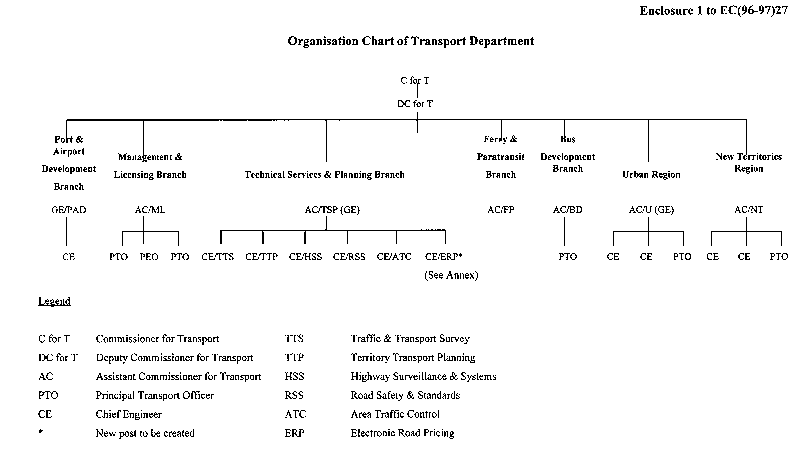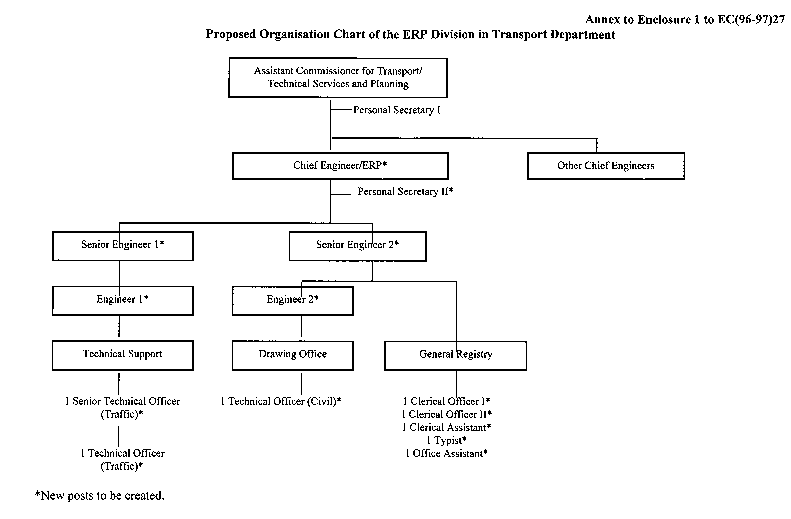For discussion EC(96-97)27
on 1 July 1996
ITEM FOR ESTABLISHMENT SUBCOMMITTEE
OF FINANCE COMMITTEE
HEAD 186 - TRANSPORT DEPARTMENT
Subhead 001 Salaries
Members are invited to recommend to Finance Committee the creation of the following supernumerary post in the Transport Department for the period up to 31 December 1999 -
1 Chief Engineer
(D1) ($80,450 - $85,400)
The Transport Department (TD) needs additional directorate support to manage and steer the proposed feasibility study on electronic road pricing (ERP).
2. We propose to create one supernumerary Chief Engineer (CE)(D1) post for the period up to 31 December 1999 to head a dedicated team in TD to manage and steer the feasibility study.
3. On 7 June 1996 the Finance Committee approved the engagement of consultants to conduct a feasibility study on ERP to examine its practicability and to assess its requirements, cost-effectiveness and consequences.
4. At present there is no full ERP system operating anywhere in the world. ERP is still a new and developing technology involving the integration of transport planning and systems technology. The formulation of an ERP pricing strategy requires elaborate transport modelling techniques to set an effective toll structure. ERP also demands the use of advanced transport telematics and computer technology for automatic vehicle detection and identification, data transmission and toll transaction. In view of the complexity of the study and the technological and engineering matters involved, the Commissioner for Transport (C for T) considers that it requires the full time engagement of a directorate officer with expertise in traffic engineering to direct the day-to-day management of the feasibility study. This officer will -
- assist in selecting the study consultants, and guiding and overseeing their work, particularly on transport planning;
- programme and co-ordinate the study activities and resolve conflicting requirements of concerned parties who may have interests on different aspects of the project; and
- ensure that the study progresses effectively and economically within budget and the tight time schedule.
5. C for T has reviewed the staffing situation in the department and found it impossible for existing resources to absorb the additional responsibilities. We therefore propose to create a CE post, to be designated departmentally as CE/ERP, to head a new ERP Division to manage the study.
6. We intend to commence the study in January 1997 and complete it in early 1999. In order to allow sufficient time to prepare, conduct and conclude the study and to assist in formulating a decision on whether to proceed further with the ERP project, we propose to create the supernumerary CE post for the period up to 31 December 1999. We will review the need for further retention of the post in the light of the circumstances prevailing at the time.
7. The proposed organisation chart of the ERP Division and the proposed job description of the supernumerary CE/ERP post are at Enclosures
1 and
2 respectively.
8. The additional notional annual salary cost of this proposal at MID-POINT is $994,200. The full annual average staff cost of the proposal, including salaries and staff on-costs, is $1,829,280. In addition, the CE/ERP will be supported by 13 lead a team of 13 non-directorate engineering, technical and general grades posts at a notional annual mid-point salary cost of $4,019,580 and a full annual average staff cost of $6,954,384. We will create these posts under the normal Departmental Establishment Committee machinery. We have included sufficient provision in the 1996-97 Estimates to meet the cost of this proposal.
9. On 11 October 1995, the Governor, in his Policy Address to the Legislative Council, committed to commissioning a technical consultancy in 1996 to examine the requirements for the ERP System as a new initiative to tackle the traffic congestion in the Territory. To enable the timely commencement of the ERP feasibility study, a supernumerary CE(D1) post was created in TD for six months from 4 December 1995 to 3 June 1996 to undertake the necessary preliminary preparatory work, including formulation of study requirements, preparation of the study brief, coordination of comments from parties concerned, and prequalification and shortlisting of consultants. This supernumerary CE post lapsed on 4 June 1996 upon completion of the preliminary preparatory work.
10. The Finance Committee approved on 7 June 1996 a non-recurrent commitment of $90 million for the ERP feasibility study vide FCai FCR(96-97)20. The Committee noted that in order to steer and manage the consultancy study effectively, the TD would need to set up a small dedicated team of about 14 staff, including the CE/ERP post proposed in this paper.
11. The Civil Service Branch considers the ranking, grading and duration of the proposed post appropriate, having regard to the responsibilities and professional input required.
12. As the proposed CE post is on a supernumerary basis, we will report its creation, if approved, to the Standing Committee on Directorate Salaries and Conditions of Service in accordance with the agreed procedure.
Transport Branch
June 1996
(E4775/WIN80)
Enclosure 1 to EC(96-97)27


Enclosure 2 to EC(96-97)27
Transport Department Proposed Job Description
Rank : Chief Engineer (D1)
Office : Electronic Road Pricing
Responsible to : Assistant Commissioner for Transport/Technical Services and Planning (D2)
Main Duties and Responsibilities -
- administering, directing the work of the ERP Division and managing and supervising staff of the ERP project team;
- assisting in the selection of suitable consultants to conduct the feasibility study on ERP;
- directing the consultants on the development of transport models and other technical matters related to the feasibility study;
- planning and monitoring various activities of the feasibility study including supervision of the work of the study consultants to ensure timely completion within the approved budget;
- co-ordinating the input of policy branches, relevant Government departments and other organization on matters related to the feasibility study;
- chairing/attending working meetings to vet and approve the consultants' submissions for the feasibility study; and
- chairing technical discussion sessions with the consultants and meetings with relevant Government departments in relation to the feasibility study.
(E4775/P.7/WIN80)
Last Updated on 3 December 1998